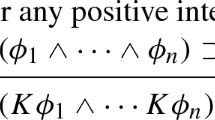Abstract
Gaining information can be modelled as a narrowing of epistemic space. Intuitively, becoming informed that such-and-such is the case rules out certain scenarios or would-be possibilities. Chalmers’s account of epistemic space treats it as a space of a priori possibility and so has trouble in dealing with the information which we intuitively feel can be gained from logical inference. I propose a more inclusive notion of epistemic space, based on Priest’s notion of open worlds yet which contains only those epistemic scenarios which are not obviously impossible. Whether something is obvious is not always a determinate matter and so the resulting picture is of an epistemic space with fuzzy boundaries.
Similar content being viewed by others
References
Carnap R. (1947) Meaning and necessity. University of Chicago Press, Chicago
Chalmers D. (2002) The components of content. In: Chalmers D.(eds) Philosophy of mind: Classical and contemporary readings. Oxford University Press, Oxford, pp 608–633
Chalmers, D. (2007). The nature of epistemic space. http://consc.net/papers/espace.pdf, Accessed on 27/10/07.
Dretske F. (1981) Knowledge and the flow of information. Blackwell, Oxford
Dummett, M. (1978). The justification of deduction. In Truth and other enigmas (pp. 166–185). Cambridge, MA: Harvard University Press.
Floridi L. (2004) Outline of a theory of strongly semantic information. Minds and Machines 14(2): 197–222
Frege G. (1892) Über Sinn und Bedeutung. Zeitschrift f"ur Philosophie und Philosophische Kritik. 100: 25–50
Hintikka J. (1962) Knowledge and belief. Cornell University Press, Ithaca, NY
Hintikka J. (1970) Surface information and depth information. In: Hintikka J., Suppes P.(eds) Information and inference. D. Reidel, Dordrecht
Hintikka J. (1973) Logic, language-games and information: Kantian themes in the philosophy of logic. Clarendon Press, Oxford
Jackson F. (1986) What Mary didn’t know. The Journal of Philosophy 83(5): 291–295
Jago M. (2007) Hintikka and Cresswell on logical omniscience. Logic and Logical Philosophy 15(4): 325–354
Lewis D. (1979) Attitudes de dicto and de se. The Philosophical Review 88(4): 513–543
MacFarlane, J. (2008). Fuzzy epistemicism. http://johnmacfarlane.net/fuzzy-epistemicism.pdf (draft version), Accessed on 28/01/08.
Priest G. (2005) Towards non-being. Clarendon Press, Oxford
Schiffer S. (2003) The things we mean. Oxford University Press, Oxford
Sequoiah-Grayson, S. (2007). The scandal of deduction. Journal of Philosophical Logic. www.springerlink.com, doi:10.1007/s10992-007-9060-4.
Skolem, T. (1922). Einige Bemerkungen zur Axiomatischen Begründung der Mengenlehre. In Selected works in logic (pp. 137–152). Oslo: Universitetsforlaget.
Van Benthem J. (2003) Logic and the dynamics of information. Minds and Machines 13(4): 503–519
Williamson T. (1994) Vagueness. Routledge, London
Wittgenstein L. (1922) Tractatus Logico-Philosophicus. Routledge & Kegan Paul, London
Author information
Authors and Affiliations
Corresponding author
Rights and permissions
About this article
Cite this article
Jago, M. Logical information and epistemic space. Synthese 167, 327–341 (2009). https://doi.org/10.1007/s11229-008-9411-x
Received:
Revised:
Accepted:
Published:
Issue Date:
DOI: https://doi.org/10.1007/s11229-008-9411-x




